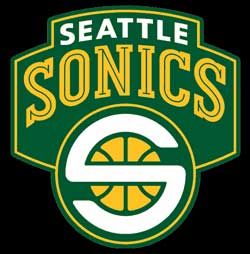“We don’t disclose the list of our owners,” says Sonics spokesperson Valerie O’Neil, but, “I can tell you that we have more than 50.” According to city and team documents obtained by Seattle Weekly, the exact count is 58—55 of whom live in the Seattle area. Team ownership is being steered by so many captains of industry that it’s thought to be the National Basketball Association’s largest group of proprietors. They include Seattle attorney Stanley Barer, ex–chief financial officer of Microsoft and Oracle Greg Maffei, Seattle developer Dave Sabey, and team president and CEO Wally Walker, according to an owners’ list, issued by the NBA head office in 2001, that is thought to have changed little. Also on the NBA’s initial list are Naveen Jain, former InfoSpace CEO; G. Scott Greenburg, a Preston Gates Ellis attorney; John Stanton, former VoiceStream CEO who now heads Western Wireless; and Peter E. Nordstrom, a vice president of the family’s retail chain.
And, of course, there’s Howard Schultz. Since formation five years ago, the Sonics parent group, Basketball Club of Seattle, has been led by a six-member board chaired by Schultz, chair of Starbucks Coffee. He is considered the owner of the NBA Supersonics and WNBA Storm professional basketball franchise, purchased for a reported $200 million from billboard-advertising and broadcasting owner Barry Ackerley. Some investors in the limited partnership formed smaller limited partnerships and invested as groups. The 2001 roster lists them as GS Enterprises (Mikal and Lynn Thomsen, Alan R. and Joyce Bender); We Got Game (Craig E. Kinzer, Richard J. Tait, Duncan MacNaughton, Dennis H. Daugs, Robert S. Angel, William H. Block, David Edelstein, H.S. Wright III, W. Russell Daggatt, John Goodman, Douglas Donnelly, and Cassemax); and In the Key (Orin C. Smith, David M. Olsen, Wanda Herndon, Michael and Jacqueline Casey, Jon A. and Julie P. Barwick, and John A. and Nancy P. Rodgers and family). Individual members of two other partnerships, Fast Break Partners and the Riverstone Group, were not named.
Schultz is thought to own just over 40 percent of the franchise. (News reports said he sold about $70 million in Starbucks stock to make the purchase.) At least a dozen of the 58 are considered major investors, with CEO Walker’s holdings pegged somewhere around 10 percent. Though team resale value has increased about 20 percent in five years and Sonics payroll is below the $60 million league average, the corporation runs in the red, having lost $58 million since 2001. Investors had to pony up millions last year to cover $16 million in 2004–05 fiscal losses. City documents show the Sonics generate 39 percent of revenue from ticket sales, 32 percent from their league and TV cuts, 22 percent from sponsorships, and 7 percent from retail, concession, and suite sales.
Schultz, besides his influential corporate positions—he’s also co-founder of the Mavron investment group—is courting city, county, and state officials to approve a new taxpayer-funded Seattle Center arena. He and five of the top investors together have given more than $20,000 to City Council and mayoral candidates since 2001. About $4,000 went to Mayor Greg Nickels. Sonics Vice President Terry McLaughlin donated $2,400 to city candidates, $1,200 of it to Nickels. The club also gave Nickels $1,350 in corporate donations last year. In the past two years, the corporation has contributed $19,000 to support a variety of political campaigns, including state Senate and House political committees, whose members in the Legislature eventually may vote on new arena funding.








